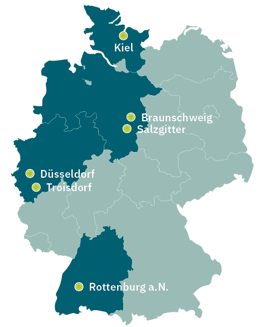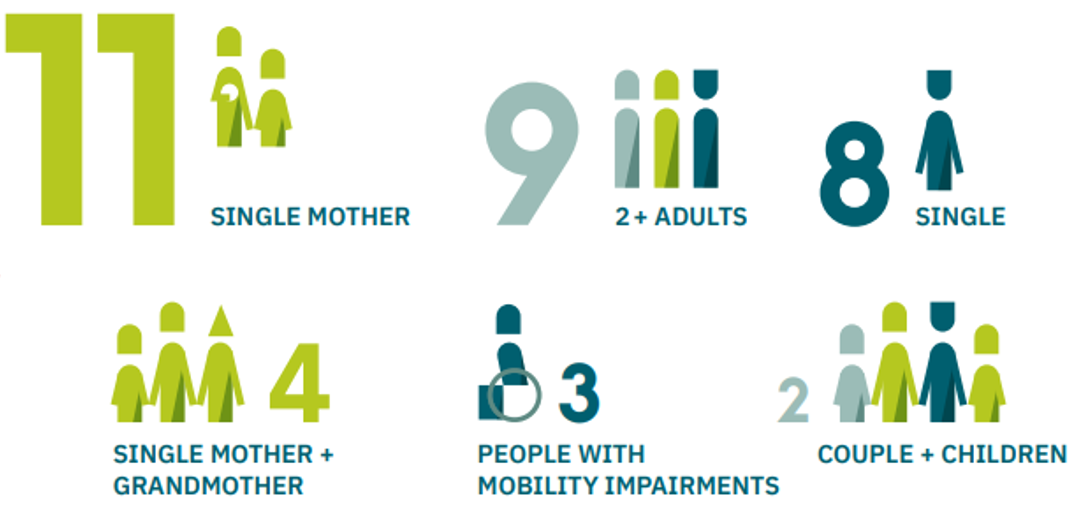
Re:Match is an innovative matching projectwhich rethinks solidarity in the European Union (EU) and the distribution of protection seekers in a new and participatory way: In contrast to conventional processes Re:Match takes the individual profiles and preferences of people seeking protection into account and matches them with the infrastructural framework conditions and capacities of cities. As a result, Re:Match opens up better future prospects for people seeking protection and offers local authorities better planning options.
Matching is carried out using a preference-based algorithm to bring both sides together in the best possible way. In the 2023 pilot phase, Pilot phase 2023 were 78 Ukrainian asylum seekerswho were present in Poland were successfully prevented by the data- and preference-driven procedure. matched with six German municipalities and supported them in their relocation . A second matching and relocation phase was carried out in summer 2024 with the aim of applying the refined Re:Match processes and gaining new insights and data. As a result, the total number of asylum seekers relocated to 8 German municipalities via Re:Match rose to 133.
Re:Match is created in close cooperation with international partners, municipalities and people seeking protection and shows how Participatory and solidarity-based approaches for local and customised reception of people seeking protection in Germany and other EU member states can be developed. The project thus presents a innovative contribution to fair and effective distribution, efficient reception and successful integration. The aim is to relieve the burden on external EU border states and support local authorities as well as protection seekers themselves in their reception and integration at the same time.
Pilot phase
09/2022 – 10/2023
Follow-up project since
11/2023
In the 2023 pilot phase, the Berlin Governance Platform and its project partner Pairity conducted a participatory process with municipalities to develop the criteria and processes for matching with people seeking protection, which was based on the results of international research. These criteria include municipal infrastructure and current capacities as well as needs on the local labour market.
Participatory workshops based on international research to develop relevant criteria for matching with municipalities were also conducted with people seeking protection. The criteria include both individual needs and preferences.
Our partner NGOs in Poland, Salam Lab (2023) and Right2Protection (2024), informed people seeking protection from Ukraine about the possibility of relocating to a German municipality and the details of participating in Re:Match.
The needs and preferences of those seeking protection were surveyed in interviews. The data from the municipalities was submitted by the municipal employees in a questionnaire. The data of participating asylum seekers and the municipalities were recorded in accordance with data protection regulations and fed into the algorithm.
People seeking protection were individualised using the algorithm and matched with the participating municipalities according to their needs.
The protection seekers were informed in detail about the match and decided whether to accept or reject the match. Enabled by the European Directive on Temporary Protection for Ukrainian Refugees, the Berlin Governance Platform team supported the preparation of asylum seekers for relocation from Poland, an external EU border state, to German municipalities.


In summer 2024, Re:Match worked with Pairity and Right2Protection to put the findings from the pilot phase directly into practice. In a second matching and relocation phase, consisting of two cohorts, 55 Ukrainian asylum seekers were finally matched with 7 German municipalities and supported in their relocation. The project is thus gathering further valuable experience and data in order to further develop the process for possible scaling. This additional data is currently being comprehensively analysed and the results will be published towards the end of 2024.
The project is being evaluated in detail and closely monitored through advocacy work at local, national and European level. The initual evaluation results as well as findings and recommendations for decision-makers are presented in two reports published in January 2024 and available for download here.
Re:Match sets a strong Focus on relevant partnerships and targeted collaboration with people seeking protection and local authorities as well as stakeholders from politics and administration, academia and other civil society organisations. Sharing knowledge and working together on a improvement of the matching criteria, the algorithm and the relocation and admission processes. The aim is to consolidate the positive impact of Re:Match in the long term. We are also examining how the processes need to be adapted in order to be able to use the matching system for different groups of people seeking protection.
Through a Close dialogue with political decision-makers at European, national and municipal level should identify potential scalabillites for further application and generate support for the idea.
The Re:Match project is currently being implemented. You can find more detailed information and updates on the implementation on the multilingual project website. For the latest updates, you can also subscribe to our newsletter.